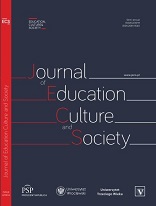The Formation and Development of Women’s Secondary Education in Volyn in the 19th–the Beginning of the 20th Century
The Formation and Development of Women’s Secondary Education in Volyn in the 19th–the Beginning of the 20th Century
Author(s): Lesia Kotsiuk, Oksana Kostiuk, Inna Kovalchuk, Victoria Polishchuk, Vadym BobkovSubject(s): Social Sciences, Gender Studies, Education, Sociology, Inclusive Education / Inclusion
Published by: Fundacja Pro Scientia Publica
Keywords: women’s education;Volyn;Women Count D. Bludov Specialised School
Summary/Abstract: Aim. The article aims to analyse the formation and development of women’s secondary education in Volyn in the 19th-early 20th centuries under historical, sociocultural, and religious factors. Methods. The authors describe the historical, sociocultural, and religious situation in Volyn of the late 19th-early 20th centuries and apply comparative diachronic and synchronous analyses of the charters of the educational institutions for girls, their curricula and weekly workload. Systematised pedagogical approaches to teaching and testing students of the analysed schools are used. Results and conclusion. The formation and development of women’s education in Volyn in the 19th-early 20th centuries represents a natural, consistent change in the content and structure of educational processes under certain specific historical conditions. Due to subordination changes in the region, private Orthodox boarding houses for noble girls became widespread in Volyn. Ostroh Women’s Specialised School, founded by Countess Antonina Bludova, underwent a qualitative and structural transformation under the influence of specific historical events. Both Women Count D. Bludov Specialised School and the Bratsvo School aimed to raise a certified woman who can teach children at home and other educational institutions. Analysis of the statutes of educational institutions, programmes of academic disciplines, and weekly workload indicates following the educational sequence principle. In Women Count D. Bludov Specialised School, attention was paid to general disciplines in the first years of study (arithmetics, languages, geography, general history etc.). At the last stage (4th grade), students were taught pedagogy (methodology) directly related to their future profession.
Journal: The Journal of Education, Culture, and Society
- Issue Year: 12/2021
- Issue No: 2
- Page Range: 227-240
- Page Count: 14
- Language: English

